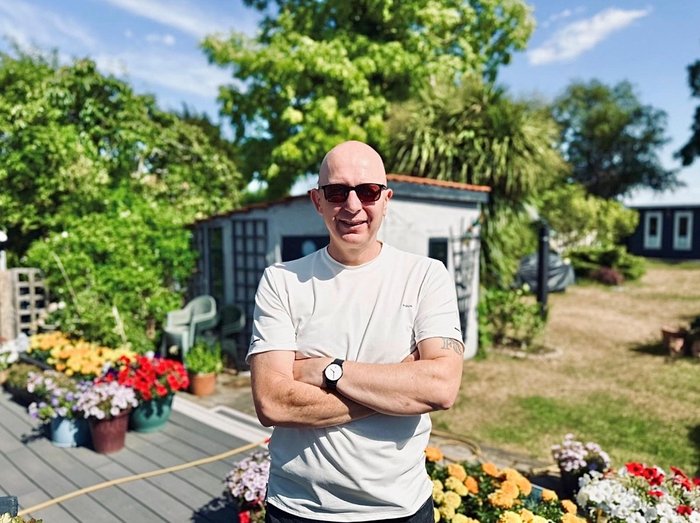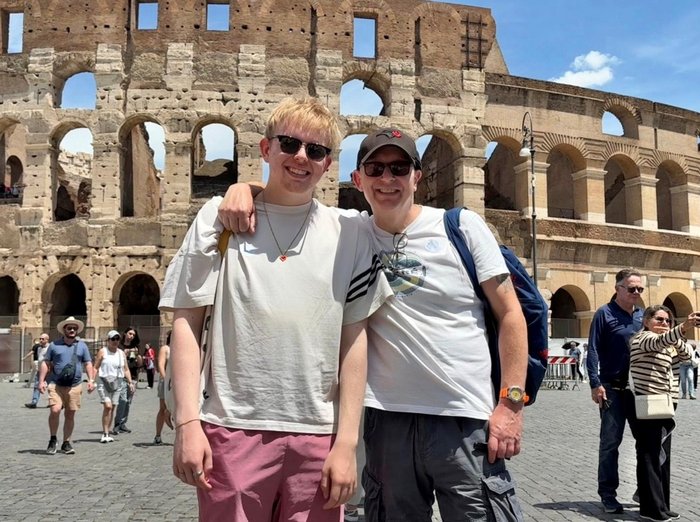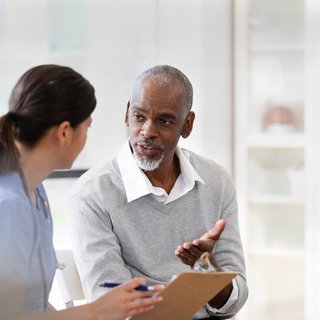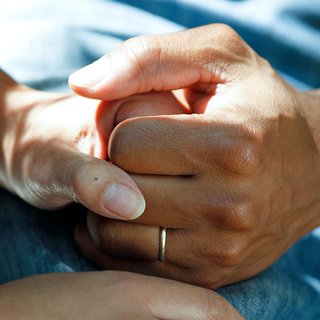I didn’t know that losing interest in things meant I was depressed
Mark showed symptoms of depression after taking interferon for essential thrombocythaemia, but at the time didn’t realise what was happening. He shares his story.

Before you read on:
This story contains references to depression and suicide, which you may find distressing. If you need support, you’ll find contact details for the Samaritans at the bottom of the page.
I was diagnosed with essential thrombocythaemia (ET) in August 2019, and I was immediately put on a treatment called interferon. I was taught how to inject it and given lots of information, including a leaflet about counselling. I’ve always been a very positive person and I didn’t get the chance to think too much about everything at the time, I mainly just hoped that my symptoms would go away and that the pain and tiredness could be managed.
About three months after diagnosis, everything seemed to be going OK physically, but I noticed I was starting to lose interest in things. I love music, and I have my favourite songs and playlists that I usually go to.
I remember sitting down to work and just scrolling though Spotify every day, thinking “I don’t want to listen to that, or that.” I would spend 45 minutes wondering why I didn’t want to play any of my usual stuff, before giving up and working in silence.
Another thing was, I went to the football a lot with my friends, and I used to get really excited about it. I’d wake up in the morning and really look forward to going. And I realised I never felt that anymore. I woke up on match days, and the excitement was gone.
Every time I went to the hospital for my check-ups, they’d tell me all my results were good, and then they’d ask me if I had depression, because that can be a side effect of interferon. And I’d say, “No, I haven’t got depression, I’m happy about my results, I’m doing well.” And that was that. I always thought being depressed meant you were really sad, or that you got angry easily or cried all the time, and I didn’t do any of that.
I began to think that maybe the changes I had noticed were down to me not processing my diagnosis yet. I thought maybe I need to come to terms with ET being a chronic disease and accept that my life would be different.
I remembered the flyer about counselling and I spoke to Macmillan, who arranged for me to have an assessment. They told me they thought I’d benefit from a few face-to-face therapy sessions, and they arranged them for me really quickly. I was due to start them in March 2020, but of course, the world changed and we went into lockdown. Everything got cancelled, including my sessions, because they weren’t set up to do virtual therapy back then. I accepted that because there was nothing else I could do. I was still uninterested in music, and I couldn’t go to football anyway, but I told myself that maybe my tastes were just changing.
After the pandemic, I really started to feel quite ill. I’d get tired, but it wasn’t like usual tiredness, it was deep inside my chest and so hard to describe. I had tinnitus and bone pain as well, and I felt very alone. I ran my own business at the time, which was stressful and took up a lot of time and energy, so I decided to quit working and focus on myself and my health. I also approached Macmillan again and sorted out some new therapy sessions.
The counsellor suggested a few things to help, including accepting that I might change after a cancer diagnosis, finding a new hobby or interest, and grounding myself if I felt like I wasn’t coping. I trusted them and kept trying these methods for around three years, hoping that they would make me feel better, but instead I just felt worse and worse.
I went very withdrawn and quiet, and I used to hope that nobody would get in touch and invite me to things because I’d always make excuses not to go. I just didn’t want to see anyone or do anything.
One day I felt a switch had gone off in my brain. I visualised ending my life which, at the time, seemed like the most natural thing to do.
Luckily, I reached out to Guys Hospital and went in for an emergency appointment. At that appointment it was explained to me that my treatment had caused depression by stopping the creation of serotonin, which is essential for brain function. It was also discovered that it had caused liver disease which, in turn, led to having toxins in my body, some of which would have entered my brain increasing the confusion and depression. Nobody at the hospital could believe I had coped with this condition for so long.
I was immediately taken off interferon, and lots of things were put in place to help me. After about a month, I started to feel more like myself again, and I’m now being constantly monitored to see what the next steps will be.

The last thing I want is to scare anyone or put them off taking their medication, because interferon is an amazing treatment. But I do want to raise awareness of what depression can look and feel like. If I’d realised that losing interest in things was a symptom, or if my doctor had asked a follow up question at my appointments, then we might have realised sooner and put two and two together. But you don’t know what you don’t know. I’ve always been somebody who doesn’t like to make a big thing of anything, and I don’t like worrying others. But this is too important not to act on.
So, if you recognise yourself in my story, if you’re losing interest in things or keep saying no to seeing people, tell your doctor. Phone a support line, or ask for help from a friend or family member.
Even if you feel OK, keep the symptoms in the back of your mind. Watch out for them, because I know the cost of not realising until it’s almost too late. I’ve lost important relationships, and it was a horrific experience that I’ll carry with me for a long time.
I’m hoping to do a skydive to raise money for Blood Cancer UK soon, to help clean my slate and draw a line under it all. I want to show myself and my son that some positives can come out of this. Because if I can do that, I can do anything.
If you’re affected by anything in this story, or if you need some extra support, call the Samaritans on 116 123. Calls are free from any phone, and lines are open 24/7.
You can also call our free Support line during opening hours and speak to a nurse on 0808 2080 888.


